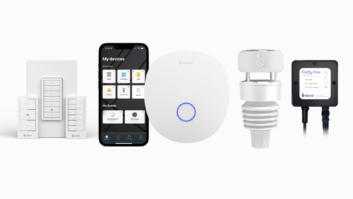How are conventional electronics retailers responding to the new Internet interlopers? In a word, aggressively.
Taking a page from the “best defense is a strong offense” playbook, storefront merchants are busy developing e-commerce strategies or actual web sites of their own, while the most brazen have already entered the brave new world of virtual retailing.
Ironically, it is the smaller, regional retailers that are leading the charge online with active selling sites, while their bigger, national brethren remain in various stages of pre-launch preparation.
Among the latter, Sears, which announced plans to begin selling white goods over its new Appliance.com web site this spring, has yet to set a debut date. The retailer’s first step, said a spokeswoman, was to get its online appliance parts business — PartsDirect — up and running last month.
The big-box specialty stores are no further along in announcing the launch of electronics sales online, although both Best Buy and Circuit City appear poised to do so.
The latter, which told investors in January that it intends to provide e-commerce in 1999, currently maintains a sweeping, consumer-friendly informational site at Circuitcity.com.
Best Buy, by contrast, already traffics in music CDs and DVD videos online but said it has no plans to add hardware to the mix this year. Nonetheless, chairman/CEO Richard Schulze said last month that Best Buy’s e-commerce strategy, along with new store openings and digital products, is creating “significant growth potential” for the company, and last week appointed John Walden president of its e-commerce division. Noted president/COO Brad Anderson, “We believe that retailing via the Internet is an integral part of our business model and offers our customers another option for shopping with us.”
Also offering their customers another shopping option are a number of regional chains and even single-unit stores whose selling sites are already up and running.
Tops Appliance City, for one, leapfrogged its virtual competitors by joining forces last June with CyberShop International, an established online retailer that’s accessible through the Yahoo! and America Online shopping channels. The resultant venture, Electronics.net, “has already met our expectations, and we’re looking for a big year,” reports general manager Jean Pierre Le Dour, who launched the site in October. “It’s going to be a high-velocity business.”
Drawing on the fulfillment resources of Tops and the e-commerce expertise of CyberShop, Le Dour said the startup already offers all categories of electronics, although logistics issues will temporarily limit sales of major appliances and big-screen TVs to Tops’ local New York-area market.
Pricing, aside from special promotions, is comparable to that of the physical stores, and shipping, which Le Dour calls his biggest challenge, was free via Federal Express for the first three months.
Taking a similar route to instant Internet status is Rex Stores, which earlier this month joined forces with e-commerce pioneer Amazon.com. According to Rex chairman/CEO Stuart Rose, the store has begun selling audio and video equipment for the e-tailer’s new auction site, giving Rex access to Amazon’s 8 million registered customers while leveraging the buying and distribution capabilities of the 228-unit, 35-state chain.
“Given our broad range of products, strong manufacturer/buying relationships, and distribution infrastructure, the Internet appears to offer an excellent growth opportunity for Rex,” Rose said. Moreover, dubbing the Amazon deal an initial test of Rex’s e-commerce strategy, he suggested that the store would pursue additional online opportunities to help it reach customers outside its core markets.
Taking the do-in-yourself approach to e-commerce are a slew of smaller electronics merchants who thank the Internet for leveling the retail playing field. Perhaps the oldest of all virtual CE stores is OneCall.com, which sprouted from the mail-order division of Huppins Hi-Fi, Photos & Video some four-and-a-half years ago.
According to director of operations Paul Lipton, the site is enjoying “significant growth,” thanks to the same full-service philosophy that Huppins has embraced for 91 years.
“Not everyone is looking for the lowest price,” Lipton said. “Some people are looking for the best price, and that includes a satisfying shopping experience.” OneCall was cited as tops in customer satisfaction in a number of web site surveys, he noted, reflecting the store’s mission statement of providing consumers with the necessary information to make an informed purchase decision.
“There’s a big difference between fulfilling an order and doing business,” said Lipton, pointing to the virtual store’s open box return policy, fully stocked warehouse, and vendor-authorized sales and service, which it shares with its storefront parent.
Like Huppins, Abt Electronics is a one-unit family business that began toying with the Internet about three-and-a-half years ago and finally took the e-sales plunge in January. “Without any marketing it has become a booming business,” reports president Mike Abt. “It’s almost to the point where it’s add-on plus business.”
AbtElectronics.com, which is registered with several search engines, has begun by selling small, easily shipped consumer electronics through the store’s own back-office operations and DVD videos via a distributor. But general manager Philip Hannon said the site will probably require its own dedicated systems in short order.
“We want to take our level of local service to the national level,” Hannon said. “Our challenge is to be more than just price, and we do that by being in stock, by taking back returns, and by being responsible.”
Vann’s, a seven-unit Montana retailer, launched its site last July to provide far-flung local customers with product information in advance of their 100-plus-mile drives to the nearest store. Today, president George Manlove describes the site — Vanns.com — as a hybrid of information and commerce that has become “an integral part of our business model,” and which he regards as an eighth location.
“We can do a good showcase presentation,” Manlove said of his virtual storefront, which sells “shippable, heavily shopped items” and maintains a 30-day return policy, a toll-free customer service number, and a flat fee for most Federal Express shipments.
Pricing, he said, is comparable to that of his brick-and-mortar stores on certain items, and Vann’s “makes a conscious effort to stay within the manufacturer’s guidelines. Vendors are very concerned about people without a profit-based business model,” Manlove said, “and they want to make sure their products are represented within a value-added infrastructure.” Also, he noted, Montana’s no-sales-tax status translates into a savings of 8% to 9%.












